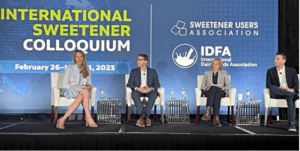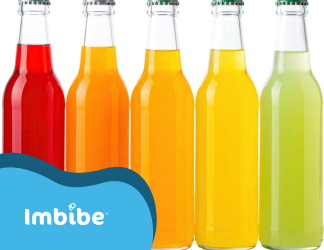 Both consumers and the government are putting pressure on food companies to reduce the amount of sweeteners in their products, a panel of experts said here today at the International Sweetener Colloquium.
Both consumers and the government are putting pressure on food companies to reduce the amount of sweeteners in their products, a panel of experts said here today at the International Sweetener Colloquium.
Courtney Gaine, president and CEO of The Sugar Association, noted that, after rising from the 1980s through 2008, sugar consumption has gone down, mostly because the sales of soda containing high-fructose corn syrup have plummeted.
Obesity and diabetes rates have continued to rise, an indication that these conditions are the result of overall increased caloric consumption, but the pressure to reduce sugar consumption continues, Gaine added.
Nutritional advice trends go through cycles, and presently “sugar is really bad and fat is OK,” Gaine said.
Kris Sollid, senior director for nutrition communications at the International Food Information Council, said that its survey of consumers shows that about three-quarters of consumers are trying to limit or avoid added sugars to avoid weight gain or lose it.
Baby boomers “are leading the pack in trying to reduce added sugars,” he said.
…
Andy Dratt, chief commercial officer for Imbibe, a company that consults with food companies on research and development, said there are two ways for a company to reduce sugar: reformulation of existing products or bring a new product to market.
The taste of sweetness is not the only quality that sugar brings to a food, Dratt said. Sugar also interacts with other flavors and adds bulk to foods. As companies consider reducing sugar as an ingredient, they have to think about what repercussions besides sweetness the change will have on the food, he said.
To read the full article, visit The Fence Post.

 Both consumers and the government are putting pressure on food companies to reduce the amount of sweeteners in their products, a panel of experts said here today at the International Sweetener Colloquium.
Both consumers and the government are putting pressure on food companies to reduce the amount of sweeteners in their products, a panel of experts said here today at the International Sweetener Colloquium.

